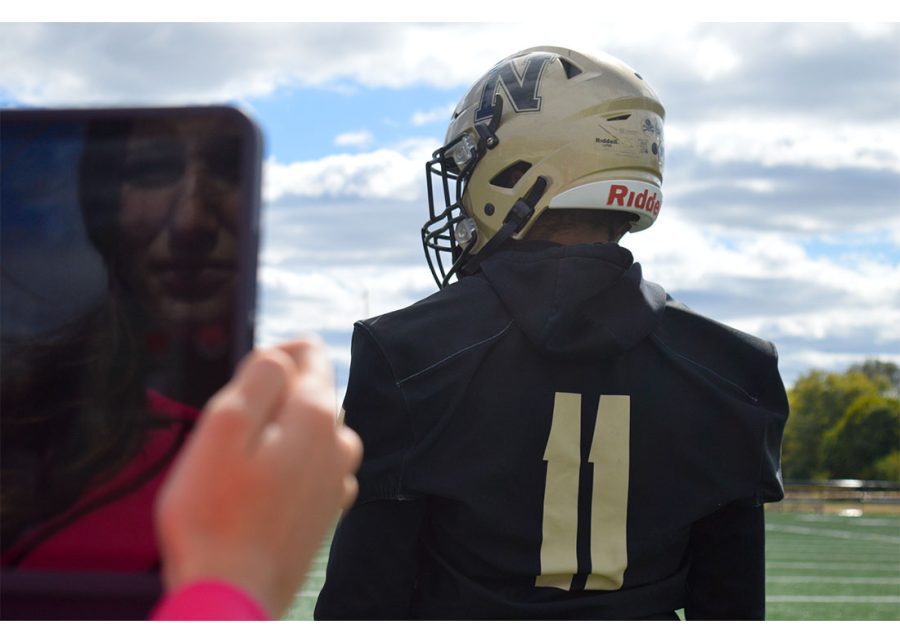More than just water girls: miller football managers reveal the overlooked truth of their responsibilities
November 4, 2022
It’s Friday, the perfect medium between the end of the school week and the start of the weekend.
It’s Friday, the last day before freedom.
It’s Friday, Game Day.
Friday means staying after school, meeting with the rest of the team for the pre-game pep-talk. Along with footballs, jerseys, and helmets, Friday means gathering all the needed gear and heading out to the familiar green of the field, a shadow behind the broad shoulder pads and teeth-marked mouth guards. However, instead of being a lazy, lingering figure hidden behind the scenes, Fridays for a certain group of busy and diligent students means they’re in the game, even though they’re not IN the game. They are the football managers.
Junior Kaylee Arriaga, a varsity football manager, has been managing the squad since her freshman year, unlike most managers who start out managing their own grade level. Equipped with three years of experience, Arriaga says managers have to build their knowledge beyond simply setting up equipment.
“We have to learn and understand the game as well as how to multitask,” Arriaga said.
The managers say their responsibilities include filming each play during practices and games, gathering all equipment, passing out headsets to coaches, and more. Sophomore Eden Short, a first-year manager, says a manager’s efforts prominently determine the program’s productivity.
“The team wouldn’t have film or anyone helping run practices by making sure all the equipment is set up and passed out,” Short said, “Without us, practices and games wouldn’t run as smoothly.”
Being a manager can have a large learning gap, so Short had to adapt to the ever-changing dynamic. When completing the multitude of tasks at hand, managers must communicate with fellow managers, coaches, and athletes.
“Sometimes it is hard to keep track of who is doing what, and people can get off task,” Short said, “so that is why communication is so important.”
Other than working behind the scenes and completing various tasks, Toni Mezzetta, a sophomore second-year manager, says the management team acts as a support system as well.
“During practices and games, when it gets tough for the players, we try to help out and cheer them up,” Mezzetta said.
Although managers try their best to encourage the football team, Arriaga feels like the efforts of managers are often overlooked. First-year manager sophomore Chloe Ninete notes the common stereotype that is often associated with managers and emphasizes Arriaga’s perception of being disregarded.
“People, and sometimes players, think that we are just water girls,” Ninete said.
The reality of the misconception, according to Mezzetta, provides credit to the people who provide the athletes with water bottles.
“Managers do not even touch the water bottles or hand them out unless we are asked,” Mezzetta said, “but the team has student trainers that help the trainers distribute water bottles.”
Arriaga detailed the skills required to be a successful manager. Although it might be easier said than done, a manger’s essential skills focus on having an attitude of confidence.Arriaga recounted how often she has to ask players and even coaches to step out of the frame of the camera in order to adequately film each play.
“You have to be assertive and you cannot be afraid to speak up,” said Arriaga, “-we have jobs to do.”
Although it can be intimidating to stand up for herself, Arriaga says she has a newfound confidence in her position. Early on in her managing career, Short developed similar strategies that also allowed her to establish and increase her self-assurance.
“I learned to grow a voice,” Short said, “and I wasn’t afraid to ask questions.”
In her process of learning the odds and ends of managing, Short learned that enjoyment can be found not only one the field, but also on the sidelines.
“I just really love the energy on the field and on the sideline,” Short said.
The managers’ contribution to the team and their devotion to the football program goes beyond what most fans see on the sidelines, despite the occasional lack of appreciation they sometimes receive. Mezzetta overlooks the claims of “just being water girls” by focusing on the truth of her motivation.
“A lot of my joy comes from managing the football team,” Mezzetta said.




